Warning: Spoilers – lots & lots of Spoilers from the Trilogy. Don’t read if you don’t want to know
Have you read The Hunger Games? the full series? been on the Facebook Capitol PN or District pages lately? Dipped into the Twitter feed #LookYourBest?
If you have, you may have noticed something really odd. If you’ve read the first book (now in theaters near you & soon to be released in IMAX!), then you know that Katniss Everdeen volunteers to be a tribute to save her sister, Prim, from certain death.
In the first novel, we see the poverty of District 12, learn about the uprising of the 12 Districts against the Capitol, the ensuing annihilation of District 13, the brutal subjugation of the remaining 12 Districts and the founding of the Hunger Games as a reminder of the destruction that rebellion & civil war lead to.
In The Hunger Games, Suzanne Collins’ story exemplifies what I have come to see as the moral core of children’s literature, which I have taught roughly twice a year for 10 years now. The power & the truth of children’s lit lies in the valuing of a child’s point of view, which in the ‘real’ world, we adults view as immature, naive, ignorant, etc etc, in contrast to the more mature, nuanced & complex understanding adults have as a result of experience, knowledge, and wisdom, as the result of more time spent on earth.
The moral core of good children’s lit is the absolute assertion of the value of the individual relationship against arguments of sacrificing one or many for the greater good. Children refuse to treat others as objects, affirming instead subject to subject relationships. You see this in Huckleberry Finn, where Huck cannot betray the immediacy of his friendship with Jim, even though he believes helping a runaway slave is wrong & will land him in hell. And in Twain’s extended critique of Tom Sawyer’s cruel victimization of Jim in the final section, when Tom directs a prolonged, unnecessary prison escape, despite knowing that Jim is now free.
It’s there in The Golden Compass where Lyra always commits to helping those who are being victimized, and she consistently positions herself against the adults in power who kill the weak for the greater good: the children at Bolvangar, Roger… Philip Pullman makes this contrast explicit in Mrs. Coulter’s and Lord Asriel’s complete lack of empathy for those they torture & kill respectively.
This moral core is fundamental to Rowling’s Harry Potter series, as Harry, Hermione, Ron & Dumbledore’s Army consistently choose to fight Voldemort’s totalitarian regime. And most importantly, what Rowling makes absolutely clear is that her characters assert their love for one another, and that those bonds exist as an aspect of identity and community that are worth self-sacrifice, as Harry shows us in the final book, but never the sacrifice of others as symbolic, token or necessary substitutes. In the film version of the Half-Blood Prince, Dumbledore says to Harry, “Just like your mother, you’re unfailingly kind. A trait people never fail to undervalue, I’m afraid.” Throughout the series and across generations, Rowling repeatedly sets kindness against cruelty, and in the final battle, we see the impact of those forces on different character arcs (Neville, Luna).
So, if you’ve only read The Hunger Games, the first novel seems to hew closely to this model. The Hunger Games are an annual sacrifice of two youths for the greater good, Katniss’ volunteering for her sister is a self-sacrifice that saves her sister from experiencing a horrible death played out as spectacle for the entertainment of the Capitol and which the Districts are obligated to witness.
And here’s where the novel starts to become tricky – Katniss’ preparation for the Games by her team of stylists is both glamourous and an enactment of the power of the state on the body of the subjugated. As Collins repeatedly tells us, Tributes are often sent into the Opening Ceremonies in stylized nakedness and as Katniss is waxed and groomed, she is grateful that her team stops short of radical body modification. The novel tenuously balances Katniss’ resistant pov on her transformation into the most beautiful girl at the Games and the seductiveness of luxury that is the central focus of the Twitter hashtag, #LookYourBest and the messaging of the Facebook Capitol and District pages.
Here’s where the disjunction between the novel(s), the marketing, and the reception start to get really strange. If you’ve read the Trilogy, then you know SPOILER! that Katniss takes on the role of figurehead leader of the revolution of the Districts against the Capitol, that she is manipulated by the leader of District 13 (not dead after all), by Abernathy, by Cinna, that Prim is killed in an unconscionable attack on the children of the Capitol, and that Karniss becomes a morphling (morphine) addict who is repeatedly being medicalized against her will, spending what seem to be numerous stretches in opiate induced unconsciousness.
That Lionsgate has made identification with the Capitol and the vacuous, privileged, style & spectacle obsessed residents of the Capitol the focal point for fans of the series is an unbelievable misstep in terms of what the series depicts as the evil at the heart of what America has become. So if you’ve read the series, images such as these are weighted with the problematic identifications we are asked to make – to President Snow, to the Capitol inhabitants who enjoy watching youth being maimed & destroyed.
In the screen shot below from The Capitol Facebook Page, the invitation to wear a white rose to ‘honor President Snow’ is distinctly problematic, given the sadistic inventiveness of the torture enacted in the Games & the violence that follows the uprisings.
Collins also makes clear that Katniss’ final choice [SPOILERS!] of killing President Coin (no accidental name here) is an act to protect the future, where the shooting of President Snow would have avenged the past. This is explicit in the contrast between Katniss and her best friend/erstwhile boyfriend, Gale, who chooses a different path, designing death traps that intentionally sacrifice the innocent for the greater good. The fact that she and he can never know for sure if his strategem killed Prim and the hundreds of Capitol children she had rushed to help is a deciding factor in Katniss (finally) choosing Peeta (which we don’t see in the novel).
What is most difficult about the series & where it is distinctly NOT Harry Potter, is that Katniss’ story, told in first-person, is the story of a teenager suffering acutely from Post Traumatic Stress Disorder without relief. The first-person voice is strategic as it means that Katniss is initially ignorant of how she is being manipulated by both sides, President Snow & District 13 leader, Coin. What it means though is that we experience Katniss’ world & story from within an extremely traumatized psyche. Unlike Rowling’s series, Katniss has no community, no network of friends, and bluntly, there is no joy in the series, which the Harry Potter series has in abundance with the affirmation of friendships and love, and the delight and wonder of the magical world. In contrast, Katniss is repeatedly betrayed by those she trusts, trauma is inflicted on her repeatedly, in the first games, then the 75th Games, where all surviving Victors compete against each other. Finnick & Annie’s wedding in The Mockingjay is a brief moment of relief and yet, Katniss is superficially engaged and Collins then kills Finnick.
Why then is this a series that speaks to its audience now?? It’s not just the parallels between the novel’s dystopic vision of a future America and the polarization and activism that has sprung up around the Occupy movement and its language of the 1% and 99%. And to be frank, this critique seems to be completely missing from the engagement Lionsgate invites and the role-playing fans engage in dressing up as Effie or playing tributes on the various online games.
What no one to my knowledge has flagged are the parallels between Katniss’ acute experience of PTSD (one could add Peeta, Haymitch, & all the other victors here, with the nightmares, the constant fear of attack), the descriptions of her physically traumatized body with the extensive burn scarring and the parallels to the phenomenon of PTSD in American military personnel returning from Iraq & Afghanistan. Here too, Peeta’s loss of a leg resonates, even though he has been fitted with a high-tech prosthesis. As a Canadian, not living in a country militarized to the degree that the US is now, I have to ask if the dystopic vision of The Hunger Games series is a mediation of what seems from across the border to be an awareness of the challenge of reintegrating the severely traumatized veterans of the War on Terror.
Nicholas Kristoff has reported that for every American soldier’s death in Afghanistan and Iraq, 25 military veterans commit suicide (TWENTY-FIVE), one every 80 minutes. That is an astonishing, devastating phenomenon. In this context, I cannot but read The Hunger Games series as a reflection on and mediation of the scarred bodies and psyches of those who return who, like Katniss or Haymitch, are barely able to connect back to an everyday life of normalicy. Collins gives us a snapshot of the future, Katniss & Peeta in the future with children, yet Katniss is clearly still scarred, not surprisingly.
So when my 13 year old daughter tells me that she loves The Hunger Games and that on reading The Mockingjay for the second time that she started crying on the first page & didn’t stop until the end, I’m not surprised. The degree of violence, victimization and brutalization surpasses that of Kathryn Bigelow’s The Hurt Locker, Kimberley Pierce’s Stop Loss, or even Michael Cimino’s The Deer Hunter (yup, I’m going that far). The sadism enacted in the series matches or surpasses the details of Charles Taylor’s regime that have hit the news this week.
There may be some parallels between Collins’ series and Rowling’s, but they are absolutely not the same in tone or experience. It might be time to start asking why this series resonates now, what fans are responding to, and what is actually being critiqued in the novels. Having read the series, how Lionsgate is going to adapt the following two novels for a PG-13 audience is beyond me as the current marketing of the film through its ARG extensions firmly positions the audience in the role of those who oppress and torture. Good luck, Lionsgate.
Nicholas Kristoff’s article here:
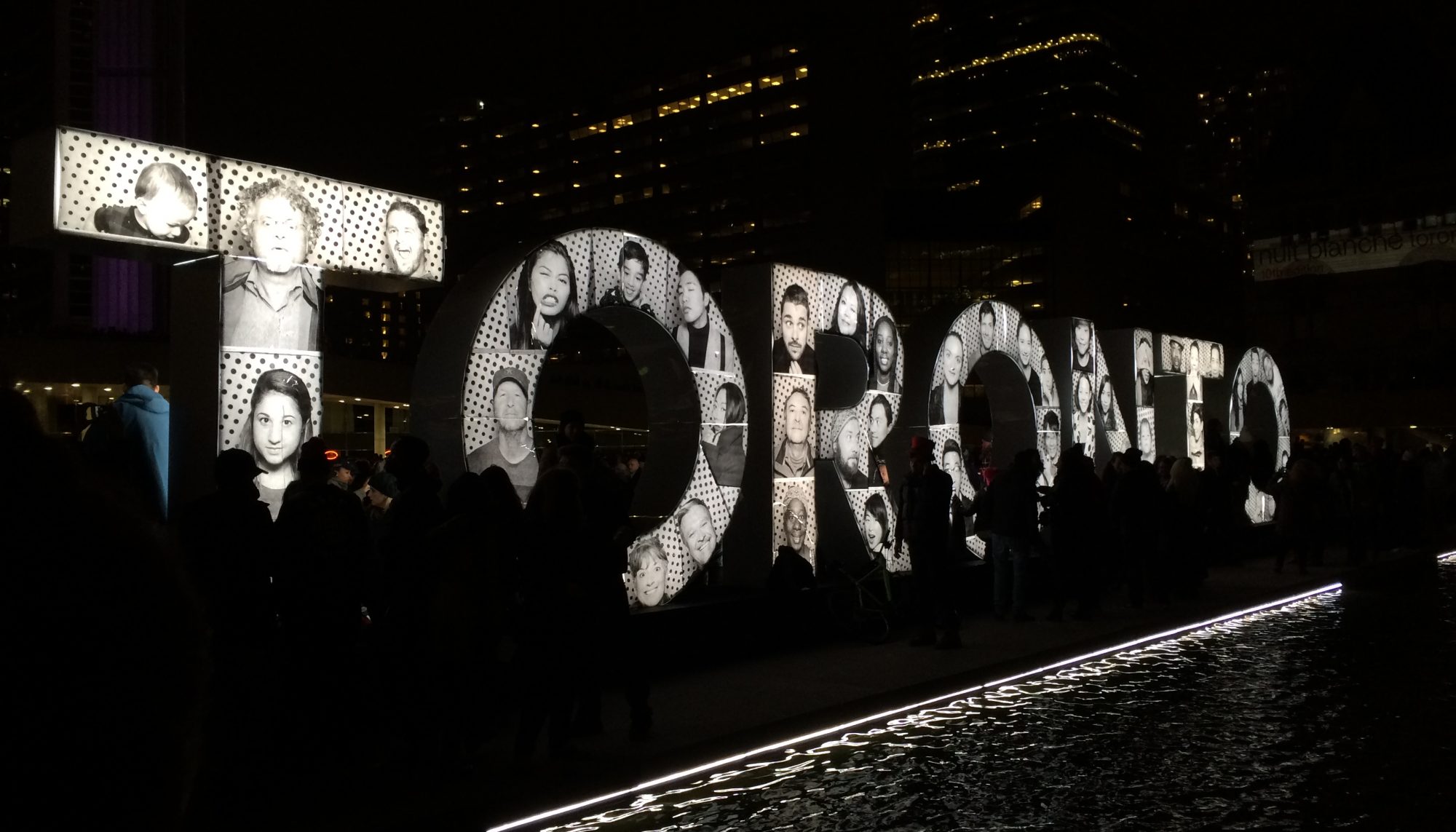
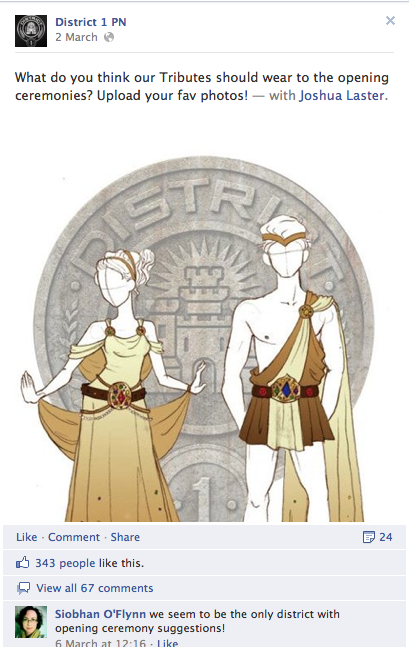
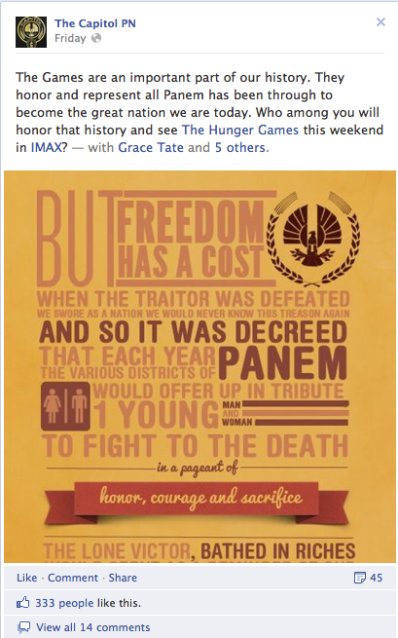
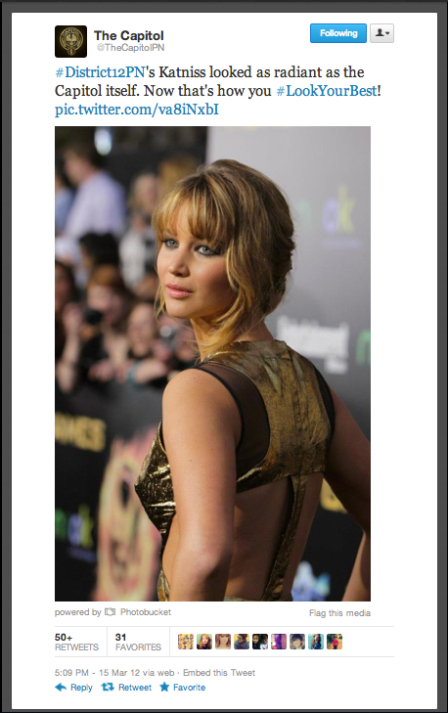

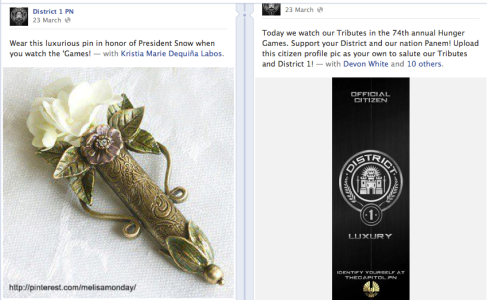
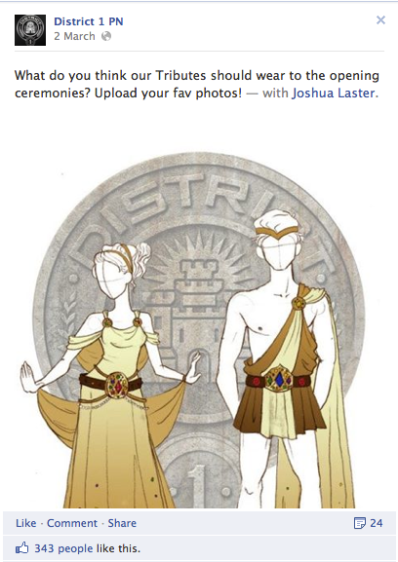

Definitely not the same!
Hi thanks for this, very interesting, especially as I had the same thoughts on how they’ll produce the other two for a teenage audience, as they get more and more brutal. Another marketing slogan is the comparison to Twighlight, which is only aimed at the peer group and has no sense of truth.
I have avoided reading/watching Twilight – though the series seems to be in very different territory re. audience, theme & content – I doubt I’ll get to reading it!
just had a long conversation about Twilight – maybe I will have to read it 😉
Brilliant disclosure of the subtle messaging created by the translation of literature into film by the ‘supporting’ transmedia pieces; confession, though — haven’t read HG precisely for the reasons you describe (but will on your advice). HP, even Twilight & Girl w/Dragon Tattoo, are about (in varying degrees) redemption through connection as you say about children’s lit. The Lionsgate promos as you describe them vis a vis the plot are counter to any fundamental message about how to improve society and keeps people mired in the exact forces that the protagonists fight to overcome. However we might wonder if the juxtaposition of the allure of being beautified and “princessified” versus the struggle for higher values are meant to get readers to ask the hard questions of themselves. The PTSD and physical scaring may also be metaphoric to the ‘cost’ of asking those questions and renouncing the ‘corruption of commercialism.’ HP is easier since the good and evil are so clearly laid out for us; we never have to wonder who to love, trust, and live through every step of the way. The core relationships are never challenged by betrayal. In that way it builds our own sense and experience of courage and resilience, enhancing rather than challenging our internal structures. What is remarkable is the emotional engagement the audience has with all the above-mentioned. Often the transformative effects happen ‘offline.’ My experience researching a Twilight fan site indicated that social validation from the shared passion transferred offline to substantive positive changes in real life by renorming and validating people’s sense of self. Does your daughter describe what she loves so much about the HG?
Hi Pamela, thanks for your thoughts and for raising the questions you do. After reading the first book & seeing the film, my response was much like yours above re. the allure of glamour & stylized body modifications. On finishing the series, I don’t think the body scarring & trauma experienced via the first-person is a metaphor for something else. Collins’ narrative is centrally concerned with the experience of the aftermath of trauma as the inability to form relationships, to trust, to love… the love story & triangle of who will she choose, Peeta vs. Gale is a gloss on these deeper concerns.. Your point re. betrayal & Potter is a good one and in contrast, in THG, there is only betrayal, arguably only one character doesn’t betray Katniss, and she also dies.. If you read the full series, I’d love to hear more of your thoughts. It is definitely worth reading.
And I think I will ask my gal what she loves…
Thank you for this post! You explain exactly what I’ve been trying to put my finger on.
I’m really glad to hear that – I was so bothered on finishing the series & it took a few days to process why – I don’t in any way think this is a bad series – it’s really important now & deserves some thought on how it’s reflecting contemporary America. And as I’m not American, I’m observing at a distance!
Thanks, Siobhan for your insights. I’ve yet to read THG or see the first film, but I will do so keeping in mind your comments. As a YA and children’s author from Australia, I have been struggling (and often despairing) with the fascination with dystopian fiction and like you, wonder why it has such appeal to today’s youth.
let me know what you think! I don’t despair of YA dystopian fiction as it seems a reasonable response to the possibility of numerous future disasters. It’s the particulars of this one that really struck me – won’t say any more as some details shouldn’t be given away!
Re: Lionsgate merchandising from the Capitol’s angle — Star Wars merchandising features the Empire, front and center. The most prominent images are of Darth Vader and stormtroopers…I guess the gleaming gear and costume coolness may be a factor, especially with the good guys being grungy rebels. The power and fear factor, too, of being able to push people around or kill worlds with impunity. But thinking for just a minute about what this says about what we’re impressed with, yikes.
Good point – what I’d love to hear from others who have read the series is how the first person pov of trauma is quite unlike in THG impacts on others – it seems to be different from what the Star Wars series deals with – though it’s been a while since I was immersed in that world. And yes, marketing is marketing, though it’s as if a studio marketed Malcolm McDowell costumes as promotion for A Clockwork Orange – that might raise eyebrows..
there’s a long tradition of anti-heroes & rooting for the bad guy – THG is so damn depressing though – no relief of humour or joy – I’ve been asking my students & others who have read the series & we seem to be unanimous about how dark it is
‘Nicholas Kristoff has reported that for every American soldier’s death in Afghanistan and Iraq, 25 military veterans commit suicide’
Approx 8k US casualties for both wars = 200k suicides? Wat?!
‘The sadism enacted in the series matches or surpasses the details of Charles Taylor’s regime that have hit the news this week.’
Either this person reads different news sources than I do, or a large number of children are made to shoot their own families dead, and/or are kept as child-bride ‘bush wives’, in the book series and I just don’t know about them because I only saw the film.
I’ll leave the question of the accuracy of Kristoff’s sources to the NY Times. The details I heard on the CBC from the coverage of Taylor’s crimes were of the disembowelment of civilians at road checkpoints with the intestines then strung out across the road as barriers. I’d say that’s an extreme. And it would help to read the series, The Mockingjay in particular, since I’m referring to the violence in the series & not the film.
You wrote: “It might be time to start asking why this series resonates now, what fans are responding to, and what is actually being critiqued in the novels. ”
*************
Thanks Siobhan for writing this well articulated post. Upon reading the trilogy, I myself was affected in the same way as your daughter. The first read of Hunger Games was fun, and the second book readable, but ending with the depressed and scarred landscape of Mockingjay was like running razors through my own personal teenage angst – in a sense ripping open old wounds and latent memories.
As the Hunger Games trilogy drew to a close, I wanted to experience a cathartic ending, a neat and ribbon-tied resolution to what I came to expect as yet another triumphant story about ‘us’ against ‘big government’. But alas, I was ‘deceived’ by Collins, the author whom I had discovered had NO qualms about being true to her own story and to herself. The trilogy left me in a state of anxiety, depression and perplexity, however it also compelled me toward a rich journey of introspection and investigation that I felt your post Siobhan truly reflected.
To echo your words, the trilogy wasn’t that different than the books I read as a young adult: “1984” and of course William Golding’s “Lord of the Flies”; a brilliant piece of story that also offered a rendition of a dystopian society where human attempts at self-government also failed with horrifying results. While the story incorporated truly repelling themes as oppression, manipulation, cruelty and even manslaughter, the book ended predictably albeit happily with adult ‘saviors’ swooping in to rescue “contrite” children in a climactic motion of rescue. Mockingjay did NOT end on that note. In fact, as you mentioned Siobhan, the experience of war eviscerated each chapter bringing the effects of PTSD to the forefront.
What are fans responding to and why now? It has taken me weeks to find words to this post because what you wrote resonated within the part of me struggling to find purpose and meaning in what we as humans quest. I visited various libraries and bookstores asking staff your carefully crafted questions. What I discovered were varied responses. Some people felt simply that the young fiction section was filled with an abundance of similar titles all but exulting werewolves and vampires (snooze and overdone!) so the Hunger Games trilogy with its honest and dark homage to our baser emotions offered a fresh breathe of non-synthetic air.
Others discussed young people’s fascination and curiosity at living a life that they have truly experienced…in North America that meant as you noted: ‘war’. While many speculations sprinkled the philosophic ambient, I came to the personal conclusion that young adults of this age, a generation addicted to various degrees of wordless information and sterile technology simply crave powerful evocative stories that challenge their sense of individuality as well as who we are collectively. It challenges the notion of how easily we can digress from what is morally good or bad all within the safe enclaves of the imagination.
Amid this ever-changing continuum of WHAT makes us ‘human’, the question of self-identity in both the Hunger Games and our personal lives takes on significant meaning. How far can we go before the ‘good’ part of our human nature assert itself or conversely where will our lower and baser motivations takes us given full reign? More importantly, will our singular and collective consciousness inform us when we actually do cross some unconscionable line?
Collins creates a dystopian myth that as Siobhan narrates clearly follows the dictates of this genre. Loss is generated over and over again typifying the callous futility of war while PTSD renders its survivors impotent…yet the machine grinds on both preserving and maintaining a structure that is both horribly addictive, as it is destructive. There is neither relief nor heroism in the very things that we create, destroy or allow to perpetuate.
The Hunger Games Trilogy may not be great ‘ratings’ material for a super blockbuster movie but it surely tells the tale of a world in which we live along with a keen and unrepentant extrapolation of what could possibly occur if we don’t consider the affects of our thoughts/deeds.
Thank you Siobhan for a superb approach to an enjoyable and deserving topic.
Hi Juliana,
thanks for such a thoughtful response to the series as a whole, as the first novel & film are set-ups for what follows after. Your comparison to Lord of the Flies highlights the absence of heroism or the enjoyment of heroism the series lacks from Katniss’ pov. Think too that her final arrow shot is almost an act of revenge & the only reason why she doesn’t take revenge is because she only has one shot. It’s quite clear that if she could, she would take revenge, which is also strikingly different from the usual arc to redemption & restoration which is more typical of children’s lit.
What strikes me this am in the bleakness you also identify is that questions of whether we act on our better or worse natures are contained in the novels by what you identity as ‘the machine’ that grinds on. That’s what makes Peeta’s desire in the first novel so important for the series, to have his death mean something & to maintain some identity of his own in his death, rather than what the Capital constructs for him, as so many of the characters are denied an opportunity for meaningful choice. And in asking what in the series resonates today in the US, again, as distinct from Canada, the anxiety of waiting for the return of those serving in Afghanistan & Iraq has got to permeate the communities that have significant numbers of youth serving in the military – low-income, minimal job prospect communities where military service is one of the few options for education & career. One of my cousins & her husband both served in Bosnia, came back & taught at West Point, & then had to do active service again in order to advance. The year her husband spent in Iraq was fraught with anxiety every day as we can all imagine. What does that common experience do to a nation or the communities most affected?? Not typical Sunday am thoughts…
Hi Siobhan! Yes you are right about Katniss’ motivation re: her last arrow in relation to how unique this book is and how it breaks free of convention. Thanks also for reminding me about Peeta’s desire to make his death ‘meaningful’ within the context of the games. Finding ‘meaning’ oftentimes is a very personal thing that one commits to the heart without witness. Sometimes though, as Katniss discovered unintentionally with her three-fingered salute to the camera, personal ‘meaningful gestures’ resonate with the masses the moment they are interpreted or recognized as such.
Thank you for discussing issues of war and military service. I think that is why your first post affected me. As a Canadian, we don’t view the world from the same kind of military stance our neighbours do. We don’t see the planes leaving filled with moms and dads asked to defend our democracy in places like Afganistan or many of the countries that need ‘protection’. We aren’t witness to single-parented families struggling hard to guide their children with only an ‘ideal’ to describe why their government feels it necessary to send loved ones away. And saying goodbye to young adults sent overseas to fight must be gut-wrenching for parents who must already feel their own mortality creep upon them.
I can’t imagine what it’s like for an entire nation, a collective psyche to experience the kind of anxiety associated with sending soldiers out not to mention dealing with the return of oftentimes traumatized individuals. But that’s the case you so carefully crafted Siobhan. No one can imagine that unless you’ve been through it. I guess that’s the point of Collins’ book. Through her writing, she is able to give us a taste of that experience although… it does take a special person with an elfin grin to interpret it all and bring us into awareness 🙂
There’s an interview with Collins where she talks about how the idea for novel came to her – She was channel surfing one night switching between reality shows & news segments on the war in Iraq… I’ll try to find it again. I think the print copy has a post-script where she talks about the novel as being about the experience of war…..
I love this article and the questions it asks. To be honest, I think the characters we (and by we I mean, North Americans and other “first world” residents) can relate to are the people in the Capitol, we are the Capitol – we see food as a pleasure, we are materialistic and covetous, we like to watch other people make fools of themselves and fail for our entertainment. I don’t think the Capitol is really that different from our own society – so I don’t find it all that weird that, that is how the marketing is going. We are the Capitol already – their values and our values (as a society not individually, this is all generalization of couse) – so it makes sense to market the Capitol to us. Some people may think the Capitol is an extreme futuristic version of us, but how far off is it really? How are THG any different than the draft? Take Vietnam for example – wasn’t the elite of the US using those disenfranchised and lower class citizens as their sacrifice, sent into to an arena to die, for the freedom and liberties of those at home – and their deaths were being broadcast on television. I know this book is pigeon-holed as a YA futuristic dystopia – but I think it is a pretty accurate examination of contemporary societal and global structure and of course, our issues. That is one of my favourite things about these books, just how similar the world of Panem is to the world of Earth. It’s not the difference that ignites my imagination and curiosity, it is the similarities – how our global society and its history is reflected and used like intertext throughout the series. War and PTSD is just one aspect.
One other thing I’d like to mention – while reading THG I was immediately brought back to when I read (the supreme) Oryx & Crake by Margaret Atwood and of course 1984 by George Orwell – which both use television as a form of power and control. Specifically O&C because of the uncomfortable closeness to our society. The one part on the chicken filets just made me squirm not because of how disgusting and alien the idea was, but because of how I could easily see that being our future, sooner rather than later. That is how I felt while reading THG – that uneasy discomfort of knowing that these are not alien concepts and thematics. It just hits so close to home, that is the most disconcerting thing. And yet for some reason, it as also the thing that made me love the books so so so much.
Hi Ruby on the Ledge!
thanks for your great response – and egad! I lost your comment in the spam & found it deleting junk. I totally agree with your take, Oryx & Crake is to me weak writing, fairly derivative & not very innovatively futurist in what she conceives – read M.T. Anderson’s Feed – when I started teaching it in 2004, it was sci fi, & students really didn’t like it – tone, trajectory. I dropped it for a few years & picked it up again 2 years ago – now it’s not sci fi except for 2 things not yet here and it’s an absolutely prescient novel as to where first world society is heading & why